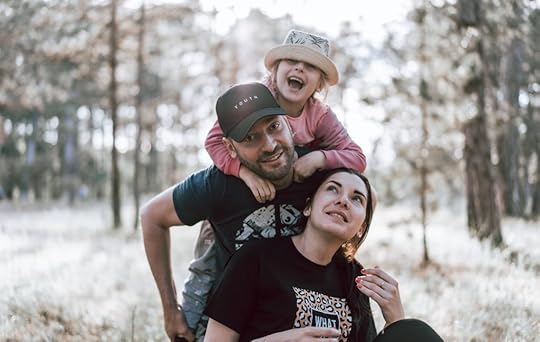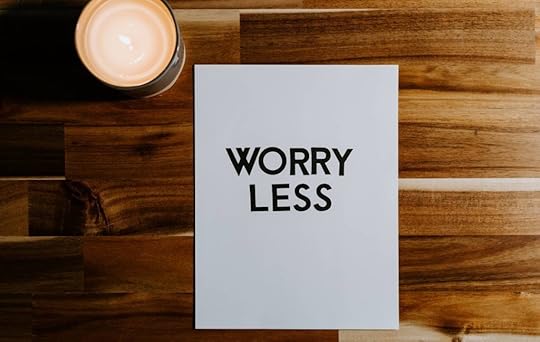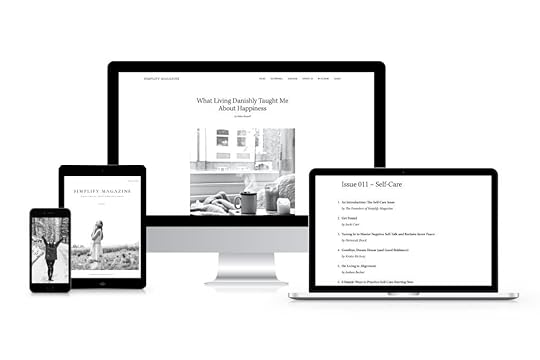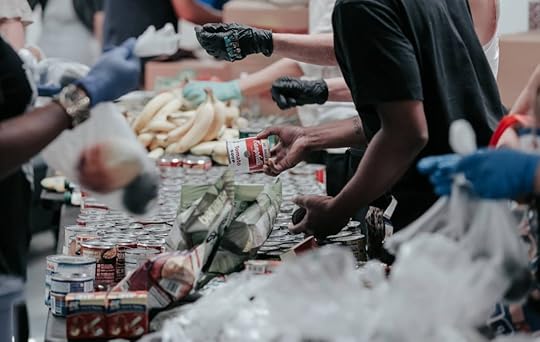Joshua Becker's Blog, page 39
January 14, 2022
Inspiring Simplicity. Weekend Reads.

For the last eight years, I have been compiling and publishing curated articles that inspire simplicity. At first, it was an exercise in communicating to Becoming Minimalist readers the most popular articles I sent out on Twitter.
But over the years, it has become more than that. It has become a place where people (every other week) come for a dose of inspiration. And it has become a place to promote and encourage writers around the world who are publishing content about minimalism, simplicity, and intentional living.
I think you will enjoy this collection of articles hand-selected for you this weekend. Grab some coffee, tea, or lemonade and be inspired to live a simpler life today.
My Family Had Way Too Much Stuff. Here’s How Becoming Minimalists Changed Our Lives. | Huffington Post by Christina Crawford. “Once we got rolling, it became intoxicating. After we finished a room, I would gaze at the pile of junk and shake my head. Why hadn’t we done this years before?”
Want to Spend Less Money this Year? Try a Minimalist Low-Buy or No-Buy Period. | CNBC by Trina Paul. Maybe you ate out too frequently last year and you’re still behind on paying off your credit card bills. For many, a new calendar year might be the time to save more, reevaluate spending habits and cut down on excessive shopping.
Why Those Pretty Bins Won’t Make You Organized | Rose Lounsbury by Rose Lounsbury. Fall not into the trap of thinking organizing products will organize your life. The only thing that will help you get organized is making no-nonsense decisions about your stuff.
11 Tips for Angelenos Who Made a New Year’s Resolution to Declutter Their Lives | The LA Times* by Jeanette Marantos. Are you inspired and ready to take the plunge? Here are 11 tips to help spur you toward less clutter and more time for the things that matter.
*The LA Times allows a number of free articles per month, but may require a digital subscription if you have exceeded that amount.
Enough | Maximum Gratitude, Minimal Stuff by Karen Trefzger. We live in a culture that constantly tells us we don’t have enough.
The Crucial Decluttering Question You’re Not Asking | Becoming Minimalist on YouTube. If the question can be answered quickly, it is not an item that you need to keep.
—
Uncluttered. If you’re looking for help trying to minimize your possessions, my 12-week course will help you own less, live more, and discover the life you want. But this is the last weekend to sign-up. Registrations ends Sunday, January 16. The experience begins on Tuesday.
January 10, 2022
How to Have More Time and Money

Ever wish you had more time or money? Probably.
According to one study, 80% of working adults wish they had more time to spend with their friends and family. In a similar study, 60% of working parents “always” feel rushed.
And the New York Times, back in 2015, called the current American generation “stressed, tired, and rushed.” No doubt, many of us know that to be true.
What if there was a solution?
What if there was a way to have more time available in your life? AND more money as well?
There is a solution. And it is available right now, without spending a penny (literally).
The solution to this problem is: Shop less.
In fact, cccording to the US Bureau of Labor Statistics, the average American spent 22 minutes/day shopping in 2019.
That is the equivalent of 133 hours each year (or 10,400 hours over a lifetime) spent shopping.
And it should be noted that this survey is far more conservative than most. Some studies show the average number in many scenarios might actually be closer to 400 hours each year! That’s almost 8 hours per week.
Almost everybody I know would take more time or money if it was offered to them.
Here’s the good news: You can have more of both.
Shop less.
Some might argue, “Yeah, but I have to shop. My family needs food and toiletries and my house needs cleaning. Some of these shopping errands are non-negotiable.”
And you would be right.
To live is to consume and there is a certain level of “shopping” that will always need to be maintained. But according to the studies listed above, only 25% of our shopping is spent on necessities (groceries, toiletries, etc.). The rest is spent on nonessentials amounting to $18,000 per year for the average American.
Wouldn’t we all like an extra 25 hours and $1,500 every month?
A second argument might go as follows, “Yeah, but what am I going to do with extra money and extra time if I can’t spend it shopping?”
And the answer is, “Anything else in the world. Surely there are more important things in life than what is on sale at your local department store. All those things you want to do with your life? You should go do them.”
We are a generation struggling to find both time and money. Given that reality, it’s surprising how many of us choose to use the little free time and money we have to spend it shopping—whether going to the mall, browsing websites, or simply looking at the lives of others wishing we had the physical possessions they own.
Shopping depletes two of our most finite resources: time and money.
Now, I’m not naïve enough to assume everyone who reads this post is going to stop shopping entirely.
However, for those of us who’ve ever wished we had more time and money in our lives, take some time to seriously consider this week how shopping and buying less would provide both—now, and for the rest of your life.
January 5, 2022
An Online Course to Help You Own Less: Uncluttered

It is my passion in life to help people own less stuff and live more life.
When we have excess possessions in our homes and lives, they always rob us of money, time, and energy.
When we own fewer possessions, we can focus ourselves on the things that matter most.
My heart is to inspire people to realize that truth, and help them accomplish it in their lives.
I do that a number of different ways: There are thousands of free articles on Becoming Minimalist written over the last 13 years. I have hundreds of free videos on my YouTube channel. I’ve written four books on the topic. And am always willing to sit down for an interview—print or podcast.
But I discovered something very early on. Sometimes, people want or need a little bit more than a book, video, or podcast can offer.
For some people, reading an article is all they need to declutter their home. But often times people need more than that.
That is why I created the popular, online decluttering course called Uncluttered.
I’ve offered it three times each year since 2016. Over that time, 70,000 families have used the principles and outline to declutter their homes. It can help you too.
I created the course to offer everything a book or blog post cannot:
1. Community.
Joining a course and community like this offers the understanding that you are not alone. That there are other people, just like you, working together toward the same goal.
Like I mentioned, some people can read a book in their living room and declutter their home fully. But if that’s not you, knowing there are thousands of people working on the same decluttering project at the same time, is helpful and motivating.
To know that you can actually talk to others in a private setting (private Facebook group) is a gift that cannot be replicated reading a book alone.
People in the course talk to each other 24 hours/day, 7 days/week. It is incredibly powerful and inspiring.
2. A Week-by-Week Plan.
Another reason I created the course is to offer people a room-by-room, step-by-step, week-by-week plan for decluttering their specific home. My book, The Minimalist Home, and app, Clutterfree, also offer a strategy for working through your home, of course. But neither are tied to specific weeks, with two emails every week, quite like the course is.
When Kim and I first minimized our possessions 13 years ago, we just made up a process as we went along. “What room should we do first? What pile of things should we do next?,” were questions that we asked ourselves quite a bit.
There is no doubt, if we had had a specific and proven plan laid out in front of us, we would have been more effective and more efficient—and probably disagreed less. :)
That is what the Uncluttered course provides for people.
3. Opportunity to Ask Me Questions.
The third reason I created the online course is to provide an opportunity to ask questions.
That is just something that a book, a blog post, or a video cannot provide. At least, not in a meaningful and personal way.
But I can offer that opportunity in a smaller, more interactive community. I’m not saying I have all the right answers. But sometimes, just hearing how another person thinks about a specific issue can be all we need to adequately reframe our thinking.
And not just me, but you can ask questions of other people going through the course in a safe, encouraging group. We learn together, we grow together, and we all complete the same projects together.
That’s why I created the course, why I love it so much, and have committed to offering it for another year.
Not everybody needs it. But if you want to own less and want or need some extra help to get there, the Uncluttered Course was designed just for you. It will help you achieve that goal of decluttering your home (finally).
I offer the course only three times each year.
Registration for the New Year’s Edition just opened today at my.becomingminimalist.com.
Uncluttered costs $99 (USD). You can find more detailed information about the course and what to expect on the website (including when it starts and the full refund guarantee).
Also, just to let you know, anyone who joins the course has lifetime access so they can take it as many times as they want. I know life happens over the course of 12 weeks.
I hope you’ll consider joining us if you want to own less and live more. Register now to join me >>>
December 31, 2021
12 More or Less Resolutions You Can Start Today to Improve Your Life Forever

Over the last 12 years, I’ve made quite a few changes in my life. Some changes were small, others big. Some I kept, others I discarded.
Very few lasting changes involved the immediate addition or removal of a new habit. Most of the changes that stuck in the long run were simply slight adjustments to my life.
I know some people debate the usefulness of New Year’s resolutions. Often, this is because people simply attempt too much. Rather than adopting an approach of “1% better,” they think resolving to change 100% is the way to go. But that rarely works.
A better approach is to start where you are, with the life you are living, and make slight adjustments.
For example, rather than saying, “I am going to exercise every day this month.” Try, “I am going to exercise more than I do now.” You get to decide what that “more” looks like exactly. Your improvement doesn’t have to be drastic to begin moving your habits in a positive direction. And getting just 1% better every week adds up quickly.
To that end, here are 12 “More or Less Resolutions” you could start today to improve your life forever:
1. Own less stuff.
I cannot begin to explain how much my life changed when I decided to own less stuff. Owning fewer possessions freed up time, money, space, and energy in my life—in both the short run and the long run.
Make this the year you decide to own less and recognize again that your life is too valuable to waste chasing and accumulating material possessions.
You don’t have to own nothing to experience the benefits. Begin by owning less in some intentional ways. And see the impact that it can have.
2. Watch less television.
Want to make an immediate positive change in your life? Turn off one television series, watch one less hour of tv each week, or designate one evening for no television. You don’t need to cut television entirely, or even give up your favorite show. Just watch a little bit less.
What will you do instead? Especially if you are home alone? I’m not sure. And maybe you aren’t either. But you’ll never know how much greater of an impact you can make with your life until you stop spending your days watching others live theirs.
This resolution could also apply to YouTube, Tik-Tok, or social media.
3. Eat a healthier diet.
Eating healthier is no doubt one of the top resolutions made by people every year. As well it should be. A healthy diet fuels a healthy body to live a healthy and fulfilling life.
Rather than trying to change your entire diet at once, look for incremental ideas. Instead of cutting out sugar entirely, maybe you could remove it a couple days each week. Rather than switching to a no-meat diet on a whim overnight, add an extra vegetable to each meal.
Sometimes switching your diet overnight works, but that’s rarely the case. Instead, look for smaller ideas that move you closer and closer to that ideal.
4. Spend less money on unnecessary purchases.
We all need food, shelter, and clothing. To live is to consume and that requires the use of financial resources. But too often we confuse unnecessary purchases with actual needs. And when we do, money gets even tighter and financial stress builds.
Take a good look at where your money is going, especially if you are struggling. Can you find just one or two recurring purchases that are unnecessary? If so, cut back on them in the coming year.
If you want more financial resolution ideas, here’s a list of ten.
5. Read more books.
How many books did you read last year? 12? 3? 0?
Whatever that number was for you, read more this year. There is benefit in both fiction and nonfiction.
6. Become more generous.
I don’t think you’ll ever regret a life lived for others. In fact, the science supports this assumption that the most fulfilled lives are those lived for others.
So how can you be just a little more generous with your life this year? Give a little more money? Volunteer a few more hours?
7. Ask more questions.
One of the best pieces of life advice I ever received came from a gentleman, just a few years older than me, sitting down for dinner at a friend’s house.
He said to me, “One of the easiest ways to become interesting is to learn how to ask good questions.” That was over twenty years ago, and I’ve never forgotten that. It has entirely changed how I interact with others—both new people I’m just meeting and people I’ve known for years.
Try it yourself this year. Make a special effort to ask more questions of the people around you.
8. Complain less.
Complaining is almost never a positive reaction to our circumstances. There are times when notifying someone of an injustice is good and proper. But most of the time, we complain simply because things aren’t going exactly as we want them.
Complaining has a negative effect on ourselves and the people around us. It brings everyone down. I know this is a tough resolution to measure because we don’t usually realize how much complaining is a part of our lives.
But I’d recommend trying to go a full day without verbalizing any complaints. A little while later, try the experiment again. The more you try it, the more you’ll notice complaining when it happens.
9. Appreciate your spouse more.
Too often, we expect the most from the people we’re closest to. We’d never make the same demands on our boss or co-worker as we do on our spouses.
When it comes to our spouses, it is easy to notice all the things we wish they were rather than appreciating all the good we see every day.
This year, resolve to appreciate your spouse more than you did last year. More compliments, more flowers, more conversations, more dates, more selfless service. You made a lifelong commitment to your spouse. Make sure your relationship is heading in the right direction this year.
10. Get more exercise.
This resolution is the perfect example of a more/less decision. If you are not active at all, resolving to go running every day this year is a resolution that will likely fall in the first week.
Instead, just decide to add more exercise to your daily routine. We’ve all been reminded of the importance of physical health these past two years. So add in just a little more than last year.
If you didn’t exercise at all last year, go for two walks/week. If you were haphazard in your physical exercise last year, set aside a specific time each week to create more consistency.
11. Pray more.
Regardless of your faith or non-faith beliefs, I’m a fan of prayer. Even if you don’t believe in God, there are still benefits to being still, expressing gratitude, and articulating heartfelt desires.
If you have a religious faith, resolve to pray more this year—whatever that means for you.
If you do not have a religious faith, consider how prayer might change you. It slows our mind, calms our spirit, and centers our heart. It removes our mind from the culture of consumption that surrounds us and calls us to identify our desires and articulate our values.
12. Dream bigger dreams for your life.
You are unique and important. You hold the potential to make a significant difference in the lives of others. Maybe that means you can make a world of difference to one, or maybe that means you can be the one to make a difference to the entire world. But you never will until you believe that you can.
This year, starting today, dream bigger dreams for the person you can be and the impact you can make. Refuse to just coast through life holding out until it’s over. Live intentionally, for others, and your life will be the one that changes the most.
This coming year holds incredible potential for you. Take hold of that. Not by falsely claiming the potential to make sweeping changes overnight, but by resolving to get just a little bit better in the areas of life that matter most. Once you begin taking a few steps in the right direction, you’ll be surprised how far you can get.
December 26, 2021
Becoming Minimalist’s Top Posts of 2021

A special thanks to each of you for making 2021 such an enjoyable year at Becoming Minimalist. It was my thirteenth and I have loved every moment of it!
This website continues to reach people beyond my wildest dreams as we grow every year in new ways. As before, this growth has occurred because of the support from readers like you—thank you for helping to spread the inspiration.
Thank you for sharing this website on social media. But even more, thank you for sharing the life-giving message of owning less with your friends and family.
Here are some numeric representations of our growth:
This website was read by over 8 million people last year.Our Facebook page grew from 2,100,000 to 2,4000,000 followers.Over 88,000 people follow us on Instagram.185,000 people currently receive Becoming Minimalist posts via email. Sign-up here to do the same. Simplify Magazine, our quarterly magazine, grew to over 180,000 subscribers.11,682 new people went through our Uncluttered Course last year.Our YouTube channel grew from 135,000 to 217,000 subscribers.Over 20,000 people have now used the Clutterfree App to declutter their homes.But some of our most significant successes this past year are not found in the numbers above:
I finished a new book, Things That Matter: Overcoming Distraction to Pursue a More Meaningful Life , about overcoming the distractions that keep us from living out our true purpose. The book will be released in April.The Hope Effect, our non-profit continues to change how the world cares for orphans. Your continued support allowed us to expand into two new locations last year! Thanks to you, The Hope Effect is changing lives in Michoacán, Mexico and Chiang Mai, Thailand. In addition, you continued to grow family-style care in our existing locations in Mexico and Honduras.In case you missed any, here are the top posts on Becoming Minimalist from 2021.
Most Popular Posts from 2021 (as determined by readers):7 Daily Habits to Change Your Life Forever. The direction of our lives is decided more by the daily choices we make than anything else. And these choices are more influential to the person we are becoming than we often realize.
“Make Your Bed” and 20 Other One-Minute Habits for a Clutterfree Home. One of the most simple and effective rules for getting your life under control and keeping your home clutterfree is the “one-minute rule” introduced by Gretchen Rubin.
9 Modern Decluttering Strategies To Create a Home With Less Stuff. If you’re just getting started with minimalism, or looking for an approach to help you reach the next level, here are 9 modern voices and approaches in the decluttering movement.
Living in the Shadow of Death. During one of my last conversations with my grandfather, before he got sick on Thanksgiving, he made a statement to me that I found to be incredibly profound.
10 Things We’ve Never Regretted Spending Money On with Kids at Home. Minimalism recognizes that resources are finite and life is a trade-off. Money not spent on material possessions means more money available for other pursuits. And not just money, but time and energy and focus.
My Personal Favorite Posts from the past year:Of Course Minimalism is For Everyone. Minimalism is not a set of specific rules or guidelines and the goal of minimalism isn’t to own the fewest number of things possible. Minimalism is about owning only the possessions you need to accomplish your greatest goals in life. And it is beneficial for everyone.
Defining Success Differently. I think all of society (ourselves included) would benefit if we started defining success differently.
Do You Like the Person You Are Becoming? One of the most self-reflective, and most helpful questions we could ever ask ourselves focuses less on what we are doing, and more on who we are becoming.
Most Popular Guest Posts in 2021:The 15-Minute Rule by Hannah Brencher. “I love the idea of shifting gears and walking into a new year. I love the possibility of a fresh calendar. But I am overwhelmed by all the things I want to do, and all the things I think I can magically begin, just because January 1 arrives at the front of the calendar.”
7 Things I Learned While Wearing the Same Dress for 100 Consecutive Days by Becca Ehrlich. Yes, the same dress—every day. For 100 days!
What Growing Up “Poor” Taught Me About Minimalism by Cheryl Smith. “The nuggets of wisdom I gleaned from being raised in a low-income family are countless, and I wouldn’t trade those life lessons for anything.”
Minimalism in America is Hard. Here’s How to Do It. by Colleen Mariotti. “We are what you might call extremist when it comes to minimalism. In 2013, my husband and I sold all our belongings, packed one carry-on bag each, and set out to wander the world with our three young children.”
Most Popular Outgoing Links from the past year:Why EVERYONE Should Adopt These 3 Minimalist Principles by Rachelle Crawford. Now, I typically take a more “you do you” approach to minimalism, but there is so much more to becoming a minimalist than reducing the number of material possessions in your home.
Drowning in her possessions, Jennifer turned to a ‘freeing’ new lifestyle by Evelyn Lewin. While emptying her home was hard, Jennifer also struggled with the idea of not buying new things. But she soon thrived on the “financial breathing room” it afforded her.
10 Problems Solved By Owning Less Stuff by Ronald Banks. It’s crucial to understand that when we hold on to things, we’re creating unnecessary hurdles in our lives that we can easily avoid if we let go of the excess.
Get Rid of Your ‘Sentimental’ Junk by Claire Lower. I don’t know how it is with other families, but mine has a tendency to be overly sentimental about every little gift, every token of affection.
Most Popular YouTube Videos of 2021:3 Things to Buy to be Happier, According to Science. In “Prosocial Spending and Buying Time: Money as a Tool for Increasing Subjective Well-Being,” researchers from Harvard, the University of British Columbia, and Simon Fraser University, discuss four possible uses of our money and their effect on happiness.
20 1-Minute Habits to Keep Your Home Clutterfree. Clutterfree is more than a project, it is also a process. It is one thing to declutter your home one time. But keeping it clutterfree requires healthy habits going forward.
8 Easy Steps to a Minimalist Bedroom. Converting your room into a minimalist bedroom doesn’t mean sleeping in a sleeping bag on the floor. It means you reduce distractions so you can optimize rest and calm.
Whether you have been reading Becoming Minimalist for one week, one month, one year or longer, thank you. This blog owes its success to the support of its readers. Thank you for reading. And thank you for sharing these posts with others.
We look forward to an exciting 2022.
I am excited to launch the New Year’s Edition of Uncluttered—registration will open on January 3rd. Uncluttered continues to help people around the world own less and live more. And I look forward to hosting it again soon.
No doubt, Becoming Minimalist will continue to evolve and be redefined. Specifically, I look forward to the new opportunities and conversations surrounding my new book.
But this website will always stay true to its core message that there is more joy to be found in owning less than can ever be found in pursuing more. We will continue to invite as many as possible to discover this truth in their lives. And I hope you will join us.
December 22, 2021
Little Piccola
This short story was first published in 1914 by Francis Jenkins Olcott, based on the poem by Celia Laighton Thaxter. It is a heartwarming story about provision, kindness, and finding beauty in small things. I hope you enjoy it this Christmas season.

Piccola lived in Italy, where the oranges grow, and where all the year the sun shines warm and bright. I suppose you think Piccola a very strange name for a little girl; but in her country it was not strange at all, and her mother thought it the sweetest name a little girl ever had.
Piccola had no kind father, no big brother or sister, and no sweet baby to play with and love. She and her mother lived all alone in an old stone house that looked on a dark, narrow street. They were very poor, and the mother was away from home almost every day, washing clothes and scrubbing floors, and working hard to earn money for her little girl and herself.
So you see Piccola was alone a great deal of the time; and if she had not been a very happy, contented little child, I hardly know what she would have done. She had no playthings except a heap of stones in the back yard that she used for building houses and a very old, very ragged doll that her mother had found in the street one day.
But there was a small round hole in the stone wall at the back of her yard, and her greatest pleasure was to look through that into her neighbor’s garden. When she stood on a stone, and put her eyes close to the hole, she could see the green grass in the garden, and smell the sweet flowers, and even hear the water splashing into the fountain. She had never seen anyone walking in the garden, for it belonged to an old gentleman who did not care about grass and flowers.
One day in the autumn her mother told her that the old gentleman had gone away, and had rented his house to a family of little American children, who had come with their sick mother to spend the winter in Italy.
After this, Piccola was never lonely, for all day long the children ran and played and danced and sang in the garden. It was several weeks before they saw her at all, and I am not sure they ever would have done so but one day the kitten ran away, and in chasing her they came close to the wall and saw Piccola’s black eyes looking through the hole in the stones.
They were a little frightened at first, and did not speak to her; but the next day she was there again, and Rose, the oldest girl, went up to the wall and talked to her a little while. When the children found that she had no one to play with and was very lonely, they talked to her every day, and often brought her fruits and candies, and passed them through the hole in the wall.
One day they even pushed the kitten through; but the hole was hardly large enough for her, and she mewed and scratched and was very much frightened. After that the little boy said he would ask his father if the hole might not be made larger, and then Piccola could come in and play with them.
The father had found out that Piccola’s mother was a good woman, and that the little girl herself was sweet and kind, so that he was very glad to have some of the stones broken away and an opening made for Piccola to come in.
How excited she was, and how glad the children were when she first stepped into the garden! She wore her best dress, a long, bright-colored woolen skirt and a white waist. Round her neck was a string of beads, and on her feet were little wooden shoes. It would seem very strange to us—would it not?—to wear wooden shoes; but Piccola and her mother had never worn anything else, and never had any money to buy stockings.
Piccola almost always ran about barefooted, like the kittens and the chickens and the little ducks. What a good time they had that day, and how glad Piccola’s mother was that her little girl could have such a pleasant, safe place to play in, while she was away at work!
By and by December came, and the little Americans began to talk about Christmas. One day, when Piccola’s curly head and bright eyes came peeping through the hole in the wall, and they ran to her and helped her in; and as they did so, they all asked her at once what she thought she would have for a Christmas present. “A Christmas present!” said Piccola. “Why, what is that?”
All the children looked surprised at this, and Rose said, rather gravely, “Dear Piccola, don’t you know what Christmas is?”
Oh, yes, Piccola knew it was the happy day when the baby Christ was born, and she had been to church on that day and heard the beautiful singing, and had seen the picture of the Babe lying in the manger, with cattle and sheep sleeping round about. Oh, yes, she knew all that very well, but what was a Christmas present?
Then the children began to laugh and to answer her all together. There was such a clatter of tongues that she could hear only a few of the words now and then, such as “chimney,” “Santa Claus,” “stockings,” “reindeer,” “Christmas Eve,” “candies and toys.”
Piccola put her hands over her ears and said, “Oh, I can’t understand one word. You tell me, Rose.” Then Rose told her all about jolly Santa Claus, with his red cheeks and white beard and fur coat, and about his reindeer and sleigh full of toys.
“Every Christmas Eve,” said Rose, “he comes down the chimney, and fills the stockings of all the good children; so, Piccola, you hang up your stocking, and who knows what a beautiful Christmas present you will find when morning comes!”
Of course Piccola thought this was a delightful plan, and was very pleased to hear about it. Then all the children told her of every Christmas Eve they could remember, and of the presents they had had; so that she went home thinking of nothing but dolls and hoops and balls and ribbons and marbles and wagons and kites.
She told her mother about Santa Claus, and her mother seemed to think that perhaps he did not know there was any little girl in that house, and very likely he would not come at all. But Piccola felt very sure Santa Claus would remember her, for her little friends had promised to send a letter up the chimney to remind him.
Christmas Eve came at last. Piccola’s mother hurried home from her work; they had their little supper of soup and bread, and soon it was bedtime,—time to get ready for Santa Claus. But oh! Piccola remembered then for the first time that the children had told her she must hang up her stocking, and she hadn’t any, and neither had her mother.
How sad, how sad it was! Now Santa Claus would come, and perhaps be angry because he couldn’t find any place to put the present.
The poor little girl stood by the fireplace, and the big tears began to run down her cheeks. Just then her mother called to her, “Hurry, Piccola; come to bed.”
What should she do? But she stopped crying, and tried to think; and in a moment she remembered her wooden shoes, and ran off to get one of them. She put it close to the chimney, and said to herself, “Surely Santa Claus will know what it’s there for. He will know I haven’t any stockings, so I gave him the shoe instead.”
Then she went off happily to her bed, and was asleep almost as soon as she had nestled close to her mother’s side.
The sun had only just begun to shine, next morning, when Piccola awoke. With one jump she was out on the floor and running toward the chimney. The wooden shoe was lying where she had left it, but you could never, never guess what was in it.
Piccola had not meant to wake her mother, but this surprise was more than any little girl could bear and yet be quiet; so she danced to the bed with the shoe in her hand, calling, “Mother, mother! Look, look! See the present Santa Claus brought me!”
Her mother raised her head and looked into the shoe. “Why, Piccola,” she said, “a little chimney swallow nestling in your shoe? What a good Santa Claus to bring you a bird!”
“Good Santa Claus, dear Santa Claus!” cried Piccola; and she kissed her mother and kissed the bird and kissed the shoe, and even threw kisses up the chimney, she was so happy.
When the birdling was taken out of the shoe, they found that he did not try to fly, only to hop about the room; and as they looked closer, they could see that one of his wings was hurt a little. But the mother bound it up carefully, so that it did not seem to pain him, and he was so gentle that he took a drink of water from a cup, and even ate crumbs and seeds out of Piccola’s hands.
She was a proud little girl when she took her Christmas present to show the children in the garden.
They had had a great many gifts,—dolls that could say “mamma,” bright picture books, trains of cars, toy pianos; but not one of their playthings was alive, like Piccola’s birdling.
They were as pleased as she, and Rose hunted about the house until she found a large wicker cage that belonged to a blackbird she once had. She gave the cage to Piccola, and the swallow seemed to make himself quite at home in it at once, and sat on the perch winking his bright eyes at the children.
Rose had saved a bag of candies for Piccola, and when she went home at last, with the cage and her dear swallow safely inside it, I am sure there was not a happier little girl in the whole country of Italy.
December 20, 2021
Thoughts on Decluttering Christmas Decorations

We discovered minimalism in the month of May.
By the time the holiday season began, six months later, we were fully convinced of the benefits of not owning more than we needed. But we hadn’t finished minimizing every area in our home—including our basement which contained the Christmas decorations.
That year was the last year we decorated with our boxes and boxes of old decorations. When the holiday season ended, we decluttered our decorations.
As a result, decorating in every subsequent year has been both easier and more meaningful. We minimized our Christmas decorations significantly (for every season actually) and have never regretted the decision.
Based on our experience, here is what we learned:
1. Declutter after the holidays.
For most people, it’s simply more practical. To declutter your holiday decorations, you’ll need to pull them all out of storage any way. If it’s near the holiday season, just use them all (or what you’d normally use) one more time.
When it comes time to put them away, purge.
This approach might also serve as a reminder of the decorating process and if it has become more time-consuming than you think it should. It will also help you identify decorations that aren’t particularly meaningful, enjoyed, or require significant effort to put up.
2. Choose a predetermined amount to keep.
In many cases, choosing a physical boundary is an invaluable minimizing technique.
You can choose any physical boundary you desire (there are no rules that you have to follow here). But selecting a boundary (and staying within it) will assist you significantly.
The first year we minimized our Christmas decorations, we decided to keep our future decorations in one large plastic tote that fit nicely in our basement. That, plus the artificial tree.
In the past, we had kept three to four boxes plus a tree. But that year, we decided to keep only what would fit in the one tote.
If you have 6-7 boxes of Christmas decorations and typically go all-out while you play your Christmas music in late-October, maybe cutting down to one box is too drastic or not even what you consider ideal for yourself and your family. Adjust accordingly. Maybe you can still minimize six boxes down to three or four.
Predetermine a physical boundary that makes sense for you.
You might be surprised how easy it is to separate the most loved decorations from the “sorta loved” once a physical boundary has been established.
3. Keep only the most meaningful.
Decorations serve an important purpose in our lives. They are not just aesthetically pleasing, they also direct our attention, mind, and focus. They can serve to enhance our mood, inspire us, and motivate us.
For that reason, think through specifically what purpose you want your holiday decorations to serve in your home.
What does the holiday season mean to you? How does it inspire you? And to what, do you desire it to motivate you?
Too often we fall into the thinking that more is better when it comes to holiday decorations. But “more” can often distract from “meaningful.” Especially if the meaning of Christmas is getting buried by excess.
When it comes to holiday decorating (any decorating really), remove the thinking that I will display an item just because it matches, or it was on clearance, or we’ve just always decorated with that item.
Instead, choose the pieces in your home that inspire you and motivate you to become the person you want to be.
Is your Christmas season about faith? Keep decorations that direct your attention there. Maybe the Rudolph hand towels in the kitchen aren’t accomplishing that purpose.
Is your Christmas season about family? Keep decorations that remind you of family—past, present, and future. Maybe some of the knick-knacks that you put up on shelving in December are actually distracting you from that.
Is your Christmas season about joy and hope and kindness? Keep decorations that spark those attitudes in your life and actions.
The Christmas season can be an important one, but only when we keep our focus where it should be.
I think everyone should make the most of the holiday season. As in most cases, this means being intentional about it: how we spend our time, how we spend our money, and how we decorate to celebrate it.
A simpler Christmas is usually more focused on the things that actually matter. You’ll love it—next year.
December 17, 2021
Encouraging Simplicity. Weekend Reads.

Minimalism is the intentional promotion of the things we most value and the removal of anything that distracts us from it. It requires a conscious decision because it is a countercultural lifestyle that stands against the culture of overconsumption that surrounds us.
The world we live in is not friendly to the pursuit of minimalism. Its tendencies and relentless advertising campaigns call us to acquire more, better, faster, and newer. The journey of finding simplicity requires consistent inspiration.
For that reason, I hope you will make an effort this weekend to find a quiet moment with a cup of coffee or tea and enjoy some of these hand-picked articles to encourage more simplicity in your life.
My Metamorphosis: From Past Consumerism to Current Minimalist | Julie Devivre by Julie B. Rose. “So to those who practice the minimalist movement, it’s subjective; there are no defined thresholds. But because there are no defined thresholds, I sometimes question whether I’m doing it wrong — if I’m ‘enough’ of a minimalist.”
The Perfect Decluttering Tip I Learned From My Friend Who’s Always Moving | Apartment Therapy by Shifrah Combiths. I don’t need to feel guilty when I donate things that no longer serve our family.
6 Sustainable Gift-Giving Ideas That Slashes Your Christmas Budget but Still Keeps Aunty Betty Happy | Medium by Charlie Brown. “You don’t want to be forced to buy your young relative yet another piece of pink plastic crap, only to see if in the trash before the year’s out.”
I’m a minimalist and only own 13 items of clothing – I don’t care if people see me in the same top all the time | The Sun by Sarah Bull. In one video, she explained that she chooses what to wear from her capsule wardrobe of 13 items on a daily basis.
Unclutter Your Life by Erasing Your Future. | Medium by Tina Lear. This unsettling practice creates unending possibilities.
14 Surefire Ways to Impress Others | Becoming Minimalist on YouTube
December 16, 2021
A Special Holiday Offer From Simplify Magazine

Although I don’t talk much about it here on Becoming Minimalist, I created a digital magazine back in 2017 called Simplify Magazine.
Simplify is a quarterly, digital publication designed to help families and individuals focus on the things that matter most.
Over the last four years, I’ve published 19 issues of the magazine for more than 250,000 readers.
Each issue of the magazine focuses on one important topic. I recruit leading experts from around the world to contribute in-depth articles covering each subject from a variety of angles.
I see it as an opportunity to use the relationships I’ve developed to bring different writers together in one place.
Simplify has no advertisements in the magazine. It is entirely reader-focused—designed to be an intentionally simple, enjoyable reading experience.
The content covers a wide-range of topics, not just minimalism. Here’s a sample of the different issues we’ve published: Happiness, Health, Stress, Technology, Relationships, Food/Diet, Self-Care, Decluttering, Communication, Organization, + nine others!
One reason for the growth of Simplify Magazine is that, unlike every other magazine in the world, I don’t charge an annual subscription. Every subscriber has lifetime access to the magazine for just $20 (USD).
That’s full access to all past, present, and future issues of the digital magazine for just a one-time fee. It’s pretty unique and I don’t know anyone else who offers a magazine like this.
I invite you to read Why Make Time for Creativity? — an inspiring piece written for the latest issue of Simplify Magazine by Jenny Doan, the face of Missouri Star Quilt Company and “the most famous quilter in the world.”
A VERY SPECIAL OFFER
If you believe the magazine articles would be helpful to you, to celebrate the holiday season, I am offering a Buy One, Gift One Lifetime Subscription to new subscribers during the month of December.
If you subscribe to Simplify Magazine before December 31, you will receive your lifetime subscription for only $20 (USD) + one free subscription to share with a friend or family member.
It’s my special way of reminding you that you are not alone on this journey and that not every Christmas gift has to result in clutter.
Subscribers receive access to all future issues and immediate access to all 19 past issues of the magazine.
December 13, 2021
The Blessing of Generosity

Last weekend, I hosted a dinner for the US-based staff of The Hope Effect. The nonprofit organization that we founded in 2015 to change how the world cares for orphans has now grown to 11 employees—three based in the US and eight based around the world.
At the dinner, I asked Joe Darago, our Executive Director, if he wanted to say a few words.
At one point during his comments, he said something that immediately caught my attention. “We are thankful for the opportunity to invite others to use their financial resources for greater pursuits than material possessions.”
“Indeed we are,” I remember thinking to myself. It was similar to a comment a mentor once said to me, “Don’t ever feel bad asking someone to volunteer with you. You are doing them a favor by providing them an opportunity to serve others.”
It is a joy to invite others to a cause greater than their personal enrichment.
Clearly, when we give our unneeded stuff, our extra money, and our available time away, we can make life better for others. But in a beautiful way, our generosity is good for us too.
I’m not saying that we should be generous so that we can benefit from it personally. We should be generous for the sake of others—that’s our motivation. But at the same time, we should expect some intangible benefits to rebound to us, and we should accept them gratefully.
I can attest that generosity makes me feel better about myself and what I’m doing with my life. And I know I’m not alone. Many people who are generous report a greater sense of satisfaction and happiness. Studies have even linked generosity to improved physical health. Amazing!
Furthermore, I’ve observed that generous people have more fulfilling relationships. People always enjoy the company of a generous giver to the company of a selfish hoarder. People are naturally attracted to others who have an open heart to share with others. And a good friend is the best gift you could ever give yourself.
Those who are generous also tend to value what they own. People who give away possessions hold their remaining possessions in higher esteem. People who donate money are far less wasteful with the money left over. And people who give their time make better use of their time remaining.
Yet at the same time, generous people find meaning outside their possessions. Which is what Joe was commenting on at our dinner.
Although many people wrap up self-worth in net worth (as if a person’s true value could ever be tallied on a balance sheet!), generous people find their value in helping others. They quickly realize that their bank statement says nothing about their true value.
Because of this, they have less desire for more. They have found fulfillment, meaning, value, and relationships outside the acquisition of possessions.
They have learned to find joy in what they already possess and give away the rest. In other words, they have found contentment.
But maybe the greatest benefit of generosity is this: generous people realize that they already have enough.
Too often we are held hostage by the pursuit of more. No matter how much we have, we always seem to need more—more stuff and more money.
We choose our careers for the sake of securing more. We spend the best hours of our day trying to obtain more. We get jealous when “less deserving” people seem to have more. And we constantly worry about having enough.
But this constant desire for more is having damaging effects on our society.
Seventy-one percent of us report feeling stress about money. There are some who experience this anxiety because of legitimate financial need, but for most of us, this stress is completely misplaced. In a world where 1 billion people live on less than $2/day, most of our financial-related stress occurs because of artificially manufactured need.
Generosity changes these thoughts and helps to remove this pursuit. It reveals to us how blessed we already are. It reminds us we already own more than we need. It shows us how much we have to give and how much good we can accomplish. It helps us see the needs of those we live alongside. And it offers a better alternative for our money than spending it on ourselves.
If you’re motivated by a desire to be more generous, let it spur you on to complete the process of living with less. And as your minimizing frees up resources you can share, go ahead and give them away with freedom and joy. Your heart will feel warmer. The world will be a better place. And you will discover you never even needed the stuff in the first place.
So this very day, donate clothing you don’t wear, sporting equipment you don’t use, books you aren’t going to read, or the furniture needlessly taking up space. Make a financial donation to a charity you support. Be generous with your time by volunteering at your local school, homeless shelter, or nonprofit of your choice.
It’s the quickest shortcut I can suggest to both happiness and living a life of impact.



